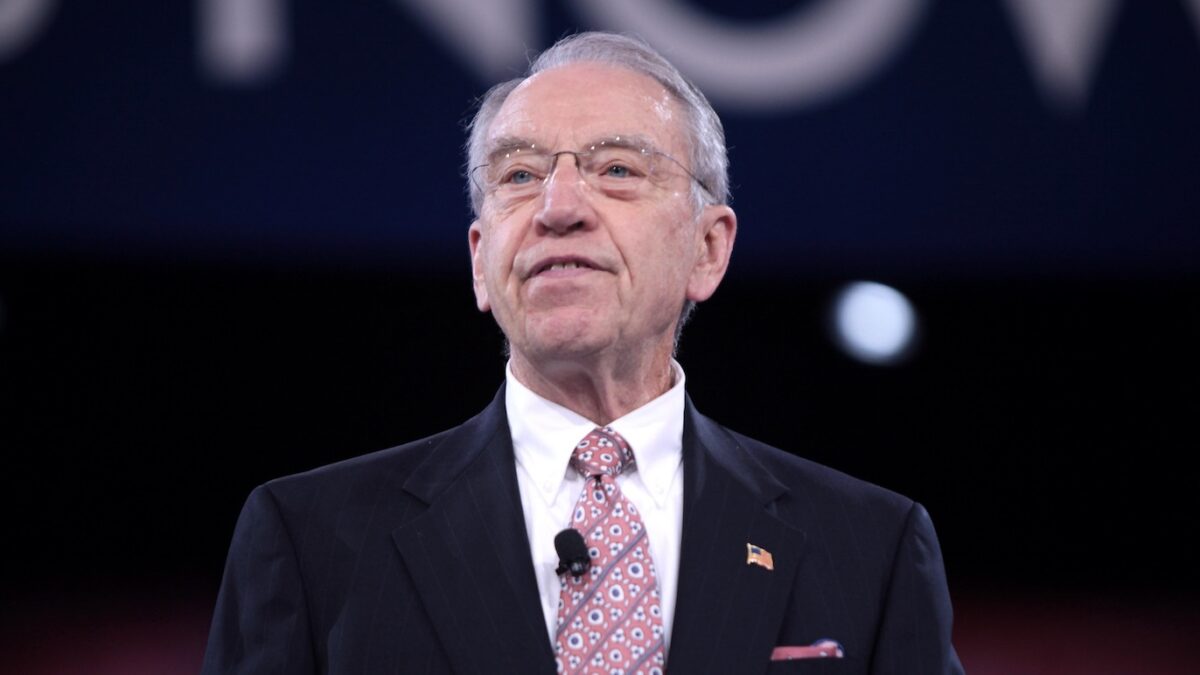
Rahm Emanuel is a liar who is eyeball-deep in corruption. He almost certainly used $5 million of taxpayers’ money to pay off the family of a murdered teenager, for the sake of preserving his political campaign. We can’t prove this. Everyone knows that it’s true.
Here are some other unpleasant facts everyone knows (at least if they’re paying attention). Chicago is drowning in debt and corruption. It’s a sinkhole of crime and cronyism, and the police have been riddled with problems, quite literally, for decades.
As with so many “everyone knows” problems, there are ways to fix this. Emanuel’s resignation would be a good start. (Sorry, but a lying apology is just an insult to all of us.) But that’s really just the beginning. The Chicago PD needs some serious restructuring. With marchers demanding action and the feds moving in, will things finally improve? That may be up to the people of Chicago.
Let’s Talk About Chicago’s Police Problem
It’s serious. That’s been clear to interested observers for a long, long time. It’s painful to say this, because I’m sure Chicago has many dedicated officers who are trying very hard to protect the public in difficult circumstances. Here’s the harsh truth, though. If the Chicago Police Department makes the news, the story is either unflattering or literally unbelievable.
Chicago’s reputation for police brutality goes back some years. We were recently reminded of this when the city offered millions in “reparations” to torture victims who suffered at the hands of Chicago Police Commander Jon Burge’s infamous “midnight crew.” Burge is a particularly dark spot in Chicago’s police history, but the list of “indiscretions” goes on (and on and on).
This year the department has been hit with a lawsuit from two officers who claim they were harassed, demoted, and deliberately put in danger for working with Internal Affairs, trying to catch corrupt cops who were believed to be taking kickbacks from drug dealers. A 20-year police veteran issued an affidavit corroborating their claims.
In what appears to be good news, Chicago has been boasting that its crime rates are finally (and very suddenly!) dropping. They credit CompStat, a widely hailed crime-control system that has had impressive results in New York City.
If that sounds a little too good to be true, that’s probably because it is. Chicago Magazine has documented evidence that the city, desperate to reverse its reputation as a hotbed of violent crime, was massaging the stats, most likely with encouragement from Emanuel. Multiple homicides appear to have been reclassified on various spurious grounds. In other words, the Chicago PD decided to leave certain murders unsolved and unpunished, for the sake of juking the stats.
Corruption Is No Secret
I’ll tell you a secret. Police corruption really isn’t so secret. Sometimes the details can be difficult to obtain. That’s aggravating for Internal Affairs, because unlike, say, your corner drug dealers, dirty politicians and ranking police officials have good lawyers, and powerful friends. You need a strong case to bring them down.
If you’re looking for the big picture, though, you don’t need a security clearance to see it. Statistics can give us a reasonably good sense of which departments have corruption and abuse-of-power issues.
For the semi-informed public, particular high-profile cases end up looming large in our imagination. Was Michael Brown going for the gun when he was shot? Was Jamar Clark really handcuffed on the ground? What really happened to Freddie Gray?
Everybody loves a good whodunit, but realistically, the details of these particular cases may or may not tell us anything interesting about policing, poverty, or urban crime. Some police shootings are justified. On other occasions, bad cops do reprehensible things, for which they should be punished.
It’s a given that both things do happen in America; our interest should be in ensuring that the latter kind of incident is rare, and strongly discouraged by law enforcement’s structure and ethos. But when the details of a handful of cases radically form public opinion, we’re likely to end up with a badly distorted picture. It’s as if we decided to gauge the state of public health by yanking five people off the street and giving them physicals.
Signs A Police Department Is Corrupt
What does it look like when a police department develops an unhealthy culture that permits abuses of power? For a disturbing peek, consider this recent story from The Guardian, documenting the troubles of Kern County, California, where 13 of the 875,000 residents were fatally shot by police over this past year. By contrast, the Big Apple had only nine fatal police shootings in the same period of time, although it has ten times as many residents and 23 times as many cops.
Of course, statistical trends can’t definitively prove anything. Perhaps Kern County is home to an unusually aggressive band of desperadoes (though if so, it doesn’t show up in its homicide rate, which is right around the national average). But if I were a resident of Kern County, I’d want to know why, in comparison to a member of the New York Police Department, a cop in my county is exponentially more likely to use deadly force.
Our analysis needn’t end there, of course. Blogging at the Washington Post, Radley Balko notes there is a troubling statistical correlation between counties with an unusually high number of death sentences, and counties that have disproportionate numbers of fatal police shootings. “It isn’t difficult to see,” Balko suggests, “how when a DA takes a ‘win at all costs’ approach to fighting crime, that philosophy would permeate an entire county’s law enforcement apparatus, from the beat cop to the DA herself or himself.”
Balko’s observations point to a broader truth the concerned public should remember. Specific cases can raise troubling epistemic questions as the public decides whether to trust the conflicting claims of cops and bystanders. But we needn’t be paralyzed by the ambiguities of a particular he-said-she-said situation, because there are a number of telltale signs that help indicate when law enforcement is sliding into lawlessness.
Digging into the numbers, we can see that police departments and courts vary widely throughout the country. These differences aren’t necessarily explicable in terms of disparate crime rates. Sub-cultures develop within the justice system, such that some counties respect due process far more than others.
When people move into a new neighborhood, they tend to ask about the schools, parks, and pollution rates. Does anyone ask about the number of fatal police shootings, or the percentage of court cases that end in plea bargains? Probably not. But maybe they should.
Support Real Reform, Not Just ‘Community Policing’
Let’s say your county has a police brutality problem. What can you do about it? What changes would actually help?
When city officials talk about improving their police departments, you’re liable to hear the term “community policing” repeated ad nauseum. It’s the perfect buzzword. Most people aren’t sure what it means, but it seems to speak to what they want: the kind of police who will serve the community instead of harassing and bullying.
Like most buzzwords, “community policing” is a nebulous term that can cover a multitude of sins. Pretty much every department in the country already claims to do it, so clearly the term doesn’t tell you much about the facts on the ground. Don’t give politicians any points for pumping “community policing.”
A reform-minded politician should have a lot to say about transparency. But don’t give people too much credit for using that word, either. You should be hearing words like “body cameras” and “public access.” The real badge of honor goes to the man willing to utter the name of the sacred cow: unions.
Police unions pose a huge obstacle to transparency, consistently opposing transparency measures and often negotiating contracts with measures to protect officers from thorough investigations.
Campaign Zero, in one of its more sensible initiatives, has combed through many police union contracts looking for these clauses. They’ve found such fishy measures as: “waiting periods” requiring investigators to let the evidence against accused officers go cold for two days before documenting anything, measures to slim down the range of civilian complaints that can be investigated, and requirements that complaints against officers be purged every two years.
It’s true, of course, that policemen sometimes need to use force on the job. No one wants to see cowardly departments hang good cops out to dry. But how can it reasonably serve the cause of justice to hobble investigation in this way?
Despite their general hatred of public-sector unions, conservatives have long had a soft spot for police unions, because conservatives respect the law. Chicago shows us what can happen when the guys with the guns aren’t held accountable for what they do.
Go for Transparency
Not every police operation can be completely transparent. Ironically, though, some of the latest research suggests that crime control is often more effective when police are upfront about their activities and enforcement priorities. When would-be criminals know that police are cracking down on particular offenses, they’re liable to modify their behavior to avoid being caught red-handed. That can make it easier for police to address the problems that are a community’s highest priorities.
The bottom line is that citizens shouldn’t be satisfied with a police force that uses security concerns as an excuse for keep the public at arm’s length. In general, law enforcement is more successful when the police have an open, working relationship with the communities they serve.
In many contexts, conservatives are energized by security concerns. We’re interested in military questions, and deeply invested in our Second Amendment rights. We tend to feel (rightly!) that it’s our responsibility to be vigilant about ensuring adequate protection for our children and other vulnerable citizens.
Good policing, however, is just as critical to keeping our neighborhoods and families safe. To get it, we need to support our local law enforcement while also demanding that they be held to high standards. Chicago should serve as a reminder of what can happen when we fail to watch the watchers.









